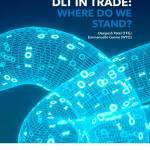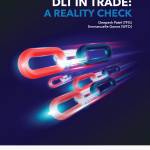An introduction to Monero | Trade Finance Global

Contents
What Is Monero?
Monero is a cryptocurrency that specialises in private and censorship-resistant transactions.
Its various privacy-enhancing technologies help ensure the anonymity of its users.
It is the only major cryptocurrency where every user is anonymous by default. The sender, receiver, and amount of every single transaction are hidden to all other participants on the network.
Most major cryptocurrency networks, including Bitcoin and Ethereum, operate using transparent blockchains, meaning that transactions can be verified and traced by anyone in the world.
While cryptocurrencies are often touted as being anonymous, in reality most are only pseudonymous. With enough effort, a network observer would be able to trace an entity back to a real world person.
Monero is different.
Its core development team’s hyper-focus on privacy means every transaction on Monero is untraceable, making it a truly fungible currency.
Merchants and individuals accepting Monero do not need to worry about blacklisted or tainted coins.
It achieves this increased level of privacy through three specific features: Ring Signatures, Confidential Addresses, and Ring Confidential Transactions.
You don’t need to understand the technicalities of how this system works to understand its value – the important thing to know is that it makes the currency 100% unlinkable and untraceable.
History of Monero
Monero started its life out in 2014 under a different name – ‘BitMonero’. This was a joining of the word ‘bit’, short for Bitcoin; and Monero, the Esperanto word for coin.
5 days later, the ‘bit’ was dropped in favour of its current name.
Since then, Monero has undergone multiple changes driven and implemented by its community and its core team of developers.
Of this core development team, only 2 members have revealed their identity: Riccardo Spagni and Francisco Cabañas.
For the first two years after Monero was founded, it didn’t see a great deal of growth.
This began to change around mid-2016 when Alphabay – a market on the darknet – began accepting Monero due to the anonymity it offers users.
This is thought to have drove the huge growth in price between August and September 2016, which saw gains of around 2700%.
This growth continued into 2017 and another major price spike occurred in August, when Bithumb added Monero trading to its exchange, making it more accessible to investors.
From 2018 to 2024, Monero remained a leading privacy-focused cryptocurrency, undergoing consistent technological advancements such as enhanced privacy protocols and .xmr domain integration while facing increasing regulatory scrutiny, resulting in delistings from major exchanges. Despite challenges, it sustained a loyal user base and continued to adapt to evolving privacy and compliance landscapes.
Monero Uses
Monero has faced heavy criticism for its use in illegal activities, such as drug trades on the dark web, due to the anonymity it provides.
This unfortunate association has lead some referring to it as the ‘currency of criminals’.
While these criticisms may be valid in many respects, there are plenty of legal use cases of Monero as well.
Privacy and anonymity are useful for many legitimate reasons.
For example,
- Businesses can use Monero to make purchases from suppliers without exposing potentially commercially sensitive information, as they would with other currencies like Bitcoin.
- Consumers can use Monero to avoid price discrimination when buying goods online by hiding their financial information.
- Monero is a fungible currency which might make it more appealing for businesses to accept payments in Monero than other currencies.
Advantages and Disadvantages
The below table outlines the main advantages and disadvantages of Monero:
| Advantages | Disadvantages |
| Fungibility. For a currency to be fungible, it’s value can’t be influenced by its source or usage. As many cryptocurrencies can be blacklisted if, for example, they were stolen, they aren’t fungible. However, as Monero is untraceable, it is also truly fungible. | Reputation. The anonymity Monero offers has lead to its adoption by black markets and it is widely used on the dark web. This association may limit Monero’s widespread adoption. |
| ASIC-resistant. The majority of many types of cryptocurrencies are mined by purpose-built units known as ‘ASIC miners’. This makes them more centralised as the supply is controlled by those who possess ASIC miners. To prevent this, Monero mining can only be completed via CPUs and GPUs. | Centralisation of miners. In spite of the fact that Monero is ASIC resistant, it still hasn’t solved the problem of disproportionate control of cryptocurrencies. Three pools control over 40% of the hash rate. |
| Privacy. This is Monero’s main selling point. It offers users true anonymity by preventing others from seeing your balance. This is something that many other cryptocurrencies lack. | Lack of wallets. It’s more difficult to developers to work on Monero than for other cryptocurrencies. Therefore, there aren’t a lot of wallets that support Monero. |
| Scalability. There is no limit to Monero’s blockchain. This scalability should prevent fees from skyrocketing as usage increases. | Lack of Adoption. Monero isn’t as widely adopted as other cryptocurrencies like Bitcoin, which limits its use. |
Monero Symbol

Interesting Facts
Here are 5 fun facts about Monero:
- WannaCry, the global ransomware attack that hit the headlines in 2017. Was reported to have converted payments received to Monero.
- The supply of Monero coins is virtually infinite as it has in built inflation. This is unlike Bitcoin which caps at 21 million
- As Monero can be mined on low budget computers using CPUs, hackers have been known to infect unsuspecting website visitor’s computers with malware designed to use their CPU to mine Monero.
Publishing Partners
- Blockchain & DLT Resources
- All Blockchain & DLT Topics
- Podcasts
- Videos
- Conferences
















